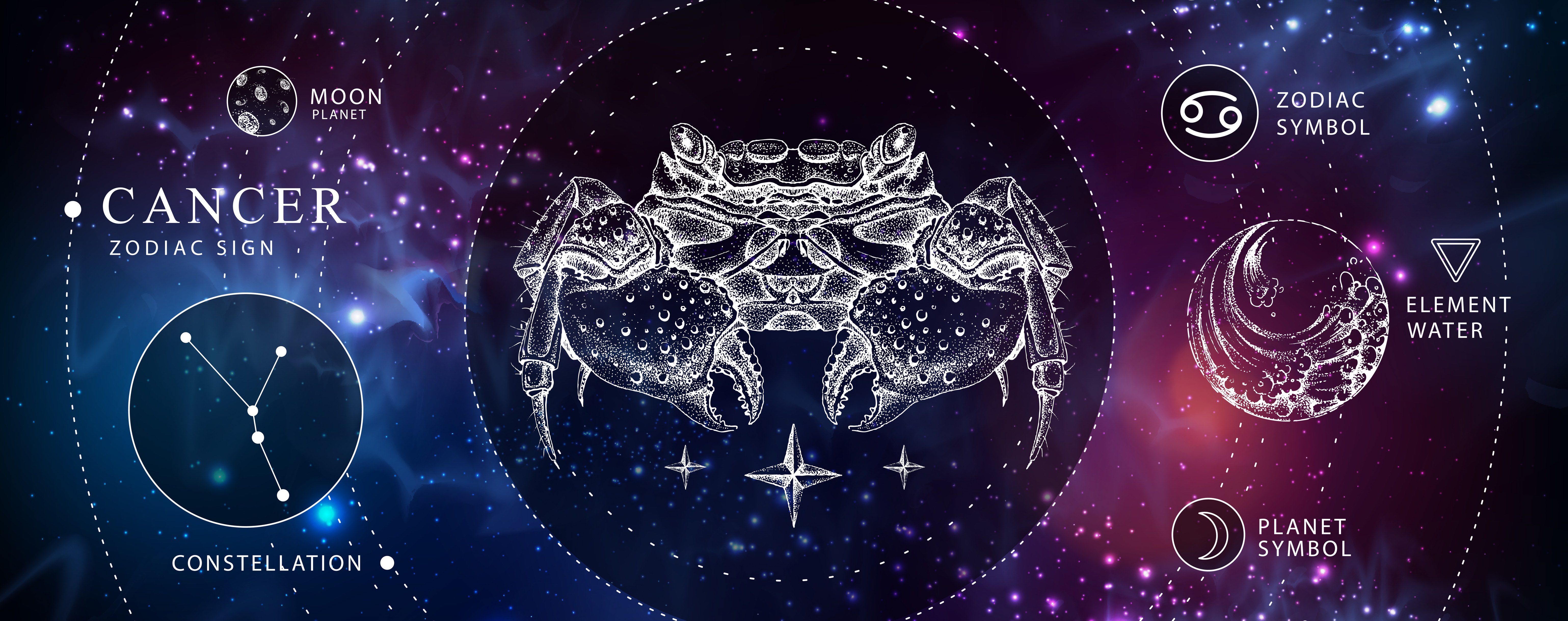
From ancient history to the present, astrology has established itself in society. Often captivated by the idea of the stars guiding one’s emotional and spiritual state, many believe in astrology despite naysayers.
Moreover, astrology allows those who invest in it a deeper understanding – not only of themselves – but also their loved ones. Take a peek into one of the twelve signs of the horoscope with these Cancer Zodiac facts.

- People born between June 22 and July 22 have a Cancer sign.
- Cancer is the fourth astrological sign in the Western zodiac.
- Cancer’s celestial longitude spans from 90 degrees to 120 degrees.
- In Vedic astrology, the Cancer sign is also known as Karka.
- Renaissance astrology connects Cancer with a Divine association called Luna or Diana.
- The sign originates from the constellation of Cancer.
- The water trigon is the cardinal sign of Cancer in astrology.
- This sign is in a trigon with Scorpio and Pisces signs.
- Its zodiac symbol is the crab.
- Cancer is one of the six negative signs in astrology.
- The constellation of Cancer is located in the Northern celestial hemisphere.
- Cancer season begins when the sun enters summer solstice in the Northern Hemisphere.
- People born under the Cancer sign can be called Cancerians.
- The opposite of Cancer is the Capricorn.
- Cancers are associated with the water element.
- The ruling planet of Cancer is the moon.
- Some depict the sign of Cancer as more of a lobster than a crab.
- Cancer is a Northern sign.
- Cancer is considered a cardinal sign or a reacting sign.
- The sign falls under the house of Neptune, in the exaltation of Jupiter.
The word Cancer comes from Indo-European origins.
The Cancer zodiac’s name roots from the Latin word “cancer”, which directly translates to “crab” in the language.
The Cancer zodiac symbol derives from the Lunar constellation of a crab.
At times, the constellation has also been depicted as different types of shellfish such as lobsters. The crab is based on the mythological Karkinos, a crab crushed by the foot of the hero, Hercules.
According to Greek mythology, Hera placed the crab’s remains in the sky, which eventually formed the constellation.
Taurus, Virgo, Scorpio, and Pisces are said to be the signs most compatible with Cancer.
People with these sun signs generally have better compatibility with Cancer than those born under Aries and Libra. This is mainly based on general compatible traits such as ideals, sexuality, and intellectual compatibility.
Cancers are commonly considered to be loyal.
A popular trait with Cancers is that they often wear their heart on their sleeves and are generally emotional. Much like a crab, they have tendencies to retreat into their shells when uncomfortable.
Cancers can often be difficult to approach, but are very protective of their loved ones and those important to them.
The Cancer sign is often associated with soft colors.
Colors commonly associated with the astrological sign include cream, silver, white, and grey. Since the sign is associated with the moon, it is also connected to nurturing and receptive colors.
White for Cancers often signifies light, purity, goodness, and innocence, much like the moon.

The zodiac symbol for Cancer was used in devotional books.
During the time of the middle ages, the zodiac symbol for Cancer was incorporated into many monuments. There are also other references to the zodiac sign in writings such as in Dante’s Paradiso.
An Italian artist and architect depicted Cancer as the guardian of the city of Verona.
In 1517, Giovanni Maria Falconetto painted the sign as a guardian for a city in Italy called Verona. The sign has also been featured in other works of art such as Agostino di Duccio’s View of Rimini Under the Sign of Cancer.
Cancers are considered self-aware.
A common belief in astrology is that water signs are considered to be in tune with their emotions. They are highly sympathetic individuals who generally feel deeper emotions than most people.
Water signs also often decide with their hearts rather than their heads.
People born under this sign may also find it hard to forgive.
When a Cancer’s trust is broken, it is often difficult to rebuild that. However, it is very difficult for these signs to forget someone whom they had shared fond memories with.
Many successful celebrities are Cancerians.
These include famous actors such as Toby Maguire, Vin Diesel, Meryl Streep, and Chris Pratt. Renowned philanthropist, Elon Musk also counts among high-profile Cancers.
Cancers have good intuition.
Out of all the zodiac signs, Cancers are blessed with the best intuition among everyone else. This allows them to observe and pick up things that may normally be looked over by anyone else.
Cancers often have a way of being able to tell when someone or something is off in any sort of way.
Cancers are often very complicated.
The personality of a Cancerian can be considered to be made up of layers. This makes it difficult to classify into just one category.
Cancers tend to do something unexpected just as a person thinks they’d already figured them out.
The birthstone of a person born as a Cancer is Ruby.
However, a sign may have more than one birthstone. Other alternatives include Moonstones, Emeralds, Sardonyx, and Pearl.
It is believed that wearing these stones may enhance the energies of its ruling planets and be focused on the wearer.
The lucky numbers for Cancer are 4 and 6.
Each astrological sign has its lucky numbers- particularly those that start or end with the digits ‘4’ or ‘6.’
This alleged luck stems from the fact that Cancer is the fourth sign of the zodiac, with its symbol resembling two ‘sixes’ facing each other on opposite ends.
Cancers often like to follow the paths they make for themselves.
A majority of the time, those with Cancer as their zodiac sign will not like being told what to do. Cancers often wish to be independent of their emotions and the decisions that they make.
When restricted to their freedom, Cancers tend to lash out aggressively and insist on what they want.

The Cancer constellation lies between Gemini and Leo.
In the zodiac, Gemini is the third sequence, while Leo is the fifth. Those born from June 18 to June 24 are considered a Gemini-Cancer Cusp as they are born between the transition of the two signs.
Gemini-Cancer cusps are also called the Cusp of Magic. On the other hand, Cancer-Leo cusps are born between July 19 to July 25. Cancer-Leo cusps are also called the Cusp of Oscillation.
Cancer symbolizes the beginning of a new season.
Cancer is said to be the dimmest constellation out of all the zodiacs. However, it was a common belief that its stars are also the Sun’s highest point in the sky for the summer solstice.
Since then, the sign of Cancer has always been associated with the beginning of summer.
The constellation of cancer is medium-sized.
Cancer’s constellation has an area of around 506 square degrees containing faint stars. The brightest star in this constellation is the Beta Cancri with a magnitude of 3.5.
The constellation of cancer contains 5 exoplanets.
One of the exoplanets in the Cancer constellation is the 55 Cancri e, which measures about 8.63 Earth masses in size and twice the diameter of the Earth.
The constellation of Cancer is invisible to the naked eye under city lights.
Because the stars in Cancer are so dim, it is best viewed via telescope, in an open area away from large cities that shine too much light. The constellation can be found in the northeast section of the hemisphere near Leo and Gemini.
Was this page helpful?
Our commitment to delivering trustworthy and engaging content is at the heart of what we do. Each fact on our site is contributed by real users like you, bringing a wealth of diverse insights and information. To ensure the highest standards of accuracy and reliability, our dedicated editors meticulously review each submission. This process guarantees that the facts we share are not only fascinating but also credible. Trust in our commitment to quality and authenticity as you explore and learn with us.
